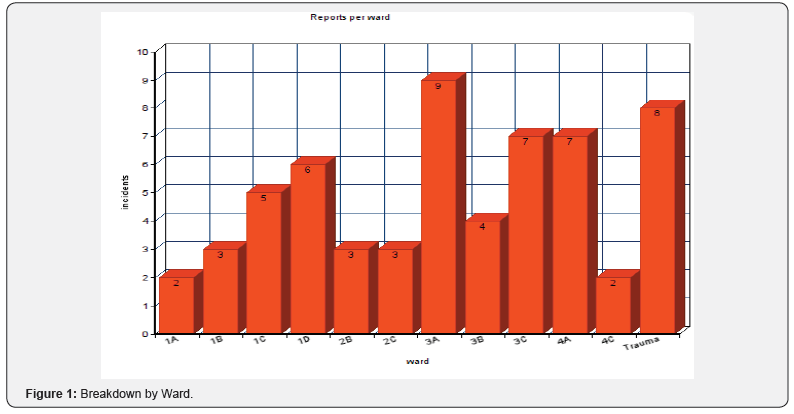When Ward Stock Impacts NCHD Productivity. Assessing the Stock Issues that Impact Interns on a daily Basis in University Hospital Limerick
Corbett M*, Chapman L, O’Shea J, Hatton S, Slattery N and O’Connor M
Department of Medicine, National University of Ireland, Ireland
Submission: October 30, 2018;Published: November 21, 2018
*Corresponding author: Corbett M, Department of Medicine, National University of Ireland, Ireland
How to cite this article: Corbett M, Chapman L, O’Shea J, Hatton S, Slattery N, O’Connor M. When Ward Stock Impacts NCHD Productivity. Assessing the Stock Issues that Impact Interns on a daily Basis in University Hospital Limerick. Curr Trends Biomedical Eng & Biosci. 2018; 17(3): 555961. DOI: 10.19080/CTBEB.2018.17.555961.
Background
On a day-to-day basis and on call, Non-Consultant Hospital Doctors (NCHDs) in University Hospital Limerick carry out a variety of procedural tasks that are required for the diagnosis and management of patients on the wards. In an ideal hospital environment, the equipment for every routine procedural task would be readily available, easily accessible and have consistent stocking between wards. Isolated incidents and case reports have identified delays in investigations and management, or waste of hospital resources due to inadequacies of stocking available on the wards. This audit sought to quantify the frequency and modality of stocking issues arising over a single week in a cohort of interns in University Hospital Limerick.
Methods
A cross sectional study of the current intern group was conducted. Given that 100% of the interns at UHL routinely use instant messaging apps [1], data was collected using WhatsApp. During a single week period between 17/11/2017 and 24/11/2017, interns were asked to record every incidence where
i. Equipment to carry out a routine task was unavailable on a ward.
ii. Equipment to carry out a routine task was split between two locations on a ward either in the same room or in two different rooms.
Results
48/54 (88%) of interns opted to remain in the whatsapp group of these 24/48 (50%) reported instances of equipment unavailability 59 instances were reported in 12/15 (80%) wards (Figure 1). Cannulation equipment was most commonly reported as inadequately stocked with 44% of reports relating to these items (Figure 2).


Discussion
While web-based messenger platforms have received criticism regarding data protection there has been little literature regarding use in quality improvement projects with no sensitive data. Our study highlights the benefits of messaging application usage in terms of a user-friendly convenient data collection tool. In our cohort of interns a significant portion of resources is wasted due to doctors resolving stocking issues.
Lack of access to appropriate equipment leads to delays in patient care and inappropriate use of alternative equipment as a compromise. Given the adoption of the EU working time directive [2] junior doctors are now working fewer hours than previously. While this has improved issues with work life balance, this has raised questions about doctors’ competency following reduced hours spent training, particularly in surgical specialties [3]. Given that there has been little reduction in demand for service provision from NCHDs the time reduction that the EU directive has offered can only be interfering with professional development. This means less teaching, less decision making, and less opportunity pursue academia. It is evident that placing the responsibility of gathering equipment and searching through unfamiliar nonstandardized wards are poor uses of valuable NCHD resources. In order to preserve the quality of future consultants we must avoid reducing time for professional development and instead look to optimise time elsewhere. Simple measures such as appropriate ward stocking and removing the burden of service provision from NCHDs could be the solution in shaping the next generation of clinicians into critical thinkers above basic service providers.
References
- O’Sullivan D, O’Sullivan E, O’Connor M, Lyons D, McManus J (2017) WhatsApp Doc? BMJ Innovations 3(4): 238-239.
- https://health.gov.ie/future-health/tackling-the-capacity-deficit/ european-working-time-directive/
- Lambert T, Smith F, Goldacre M (2016) The impact of the European Working Time Directive 10 years on: views of the UK medical graduates of 2002 surveyed in 2013–2014. JRSM Open 7(3): 205427041663270.






























